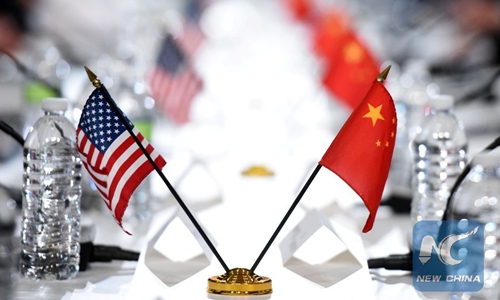HOME >> CHINA
Politicization of China-WHO relationship harms global efforts against epidemic: experts
By Leng Shumei Source:Global Times Published: 2020/2/20 22:20:55

File photo taken on November 23, 2016 shows the national flags of the United States and China during the 27th Session of the China-US Joint Commission on Commerce and Trade in Washington DC, US. Photo: Xinhua
While the world is supporting China in its battle against the COVID-19 epidemic, some US media outlet turned a blind eye to China's endeavor to curb the virus, and instead tried to politicize and poison China's relationship with the World Health Organization (WHO).
While rolling its eyes toward WHO director general Tedros Adhanom Ghebreyesus' appreciation of China's sacrifice in containing the COVID-19, CNN published an article on February 16 titled "The coronavirus crisis is raising questions over China's relationship with the World Health Organization," in which it said that "the UN agency relied on funding and the cooperation of members to function, giving wealthy member states like China considerable influence."
"As far as I know, the US is the biggest contributor to the WHO, and most experts in the organization are from the US and Europe, while only a few are from China," said Zeng Guang, chief epidemiologist with the Chinese Center for Disease Control.
According to the WHO website, the US, as the single largest contributor to the WHO, will contribute $58 million to the agency in 2020, followed by China's $29 million and Japan's $20 million.
The accusation made in the CNN report is untenable, Zeng told the Global Times on Thursday.
China and the WHO have had good and justified cooperation for many years. The organization's close exchanges with China on the ongoing epidemic come out of a practical aim to control its spread, according to Cai Jiangnan, director of the Center for Healthcare Management at the China Europe International Business School.
Denying China's endeavor to fight the virus may stem from political aims, but the move goes against the global tendency to control the epidemic and will hurt the US' own interests, Cai told the Global Times on Thursday, noting that the urgent mission for the international community at present is to face and combat the mutual enemy, in other words the epidemic.
In the same report, CNN cited the island of Taiwan being denied WHO membership as "perhaps one of the most overt examples of China's sway over the WHO," which is a common trick used by both Taipei and Washington, Cai said.
Since the beginning of the outbreak, the mainland has continuously provided Taiwan with information on the epidemic, shared relevant information, and arranged for Taiwan experts to conduct field inspections in Wuhan, according to the Taiwan Affairs Office of the State Council.
However, ignoring the mainland's efforts, Taiwan leader Tsai Ing-wen has been actively seeking a political opportunity from the epidemic to push for the island's entry into the WHO, exaggerating the threat the island faces.
Experts refuted accusations that Taiwan's absence in the WHO would worsen the epidemic situation on the island, saying that the island is just using the epidemic to seek membership to the WHO to gain sovereign state status.
The island can obtain global public health emergency information released by the WHO, which can also be notified of emergencies in Taiwan in a prompt manner. Obstacles do not exist in areas pertaining to technical cooperation between the island of Taiwan and the WHO, mainland's Taiwan affairs office said, noting that the Tsai administration had "put aside the extremely urgent epidemic situation to play political tricks."
Continuing civil cooperation
Until Thursday, over 70,000 people in Chinese mainland have been infected by the coronavirus, with 2,118 deaths. Over 1,700 Chinese medical workers have contracted the virus, of whom six have sacrificed their lives.
Chinese experts noted that US public health experts have been actively and positively supporting China in this fight against the COVID-19.
On Wednesday morning, renowned Chinese respiratory expert Zhong Nanshan held an online meeting with experts from Harvard University on the novel coronavirus for over three hours.
As early as January 29, Ian Lipkin, director of Columbia University's Center for Infection and Immunity, flew to Guangzhou, capital of Guangdong Province, to discuss with Zhong the development of the epidemic and its prevention.
On Tuesday, medical journal The Lancet published a joint statement from 27 public health experts from eight countries that expressed support for Chinese public health professionals who are fighting on the frontline against the COVID-19.
The experts include many US scientists, including James Hughes, former director of the Director of the National Center for Infectious Diseases, and Rita Colwel, former director of the National Science Foundation.
Newspaper headline: Politicizing China-WHO ties ‘harms global efforts against epidemic’
Posted in: SOCIETY